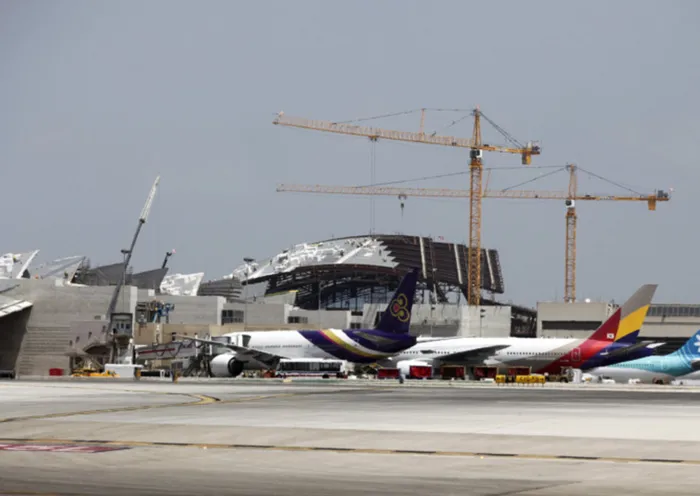Anything to declare? Just a grenade…

(File photo) The roof of the new $1.6 billion Tom Bradley International Terminal, designed to look like crashing waves, is seen under construction at LAX airport in Los Angeles. (File photo) The roof of the new $1.6 billion Tom Bradley International Terminal, designed to look like crashing waves, is seen under construction at LAX airport in Los Angeles.
London - An investigation has been launched into how a passenger boarded a US-bound plane without airport staff realising he was carrying a cache of weapons.
Yongda Huang Harris travelled from Japan with a stop-off in South Korea where screening revealed nothing suspicious but once he reached the US he was found to be wearing a bulletproof vest and had a smoke grenade, knives, clubs handcuffs, a gas mask and other weapons in his luggage.
Other items included bodybags, leg irons, duct tape a hatchet, a collapsible baton and a biohazard suit. His hand luggage had been searched when he boarded the flight and nothing dangerous was found but in the US the small armoury was located in his checked-in baggage.
Harris, a US citizen, was arrested in Los Angeles and has been charged with transporting hazardous materials, an offence that carries a maximum penalty of five years in prison. He remained in custody after a court appearance on Tuesday and is expected to return to court today.
The charge relates to the smoke grenade which is banned from planes under the United Nations' explosives shipping rules. While the rest of the weaponry may be surprising it is not thought it breached air travel regulations because it was placed in luggage that was checked in rather than carried as accessible hand luggage.
Tom Blank, a former deputy administrator at the Transportation Security Administration, said the it is likely the US authorities will try to determine if the failure to spot the hand grenade was a one-off lapse or part of a wider problem.
“This clearly looks like an error. Something slipped through that should not have slipped through,” he said.
Gadisa Goso, 29, a school administrator and neighbour of Harris' mother in Boston, said: “The one thing that concerns me is he was able to board a plane internationally with all these weapons and nobody in Japan or Korea bothered to find these things until he got to America. That's a big concern.”
Yasunori Oshima, an official at Japan's Land and Transport Ministry's aviation safety department, said there had been no official inquiry or request from US authorities to look into the case, which he said would have been more of a concern if the hazardous materials were brought on board rather than checked in.
“The case does not seem to pose any immediate concerns about aviation security measures in Japan,” he said.
Airport police said they do not believe the case constitutes illegal conduct under the Japanese domestic criminal code, but Japan may cooperate at the request of US investigators.
Masahiro Nakamoto, an immigration officer at Kansai, said Japanese authorities did not report anything suspicious at the time Harris boarded, but arriving passengers are checked more closely than those leaving the country.
If the US determines a country's airport doesn't meet US standards, it can ask for stronger security measures and even prohibit flights from flying directly to the US from that country.
There is no indication that Harris, who does not have a criminal record, is linked to a terrorist organisation or planned to damage the plane. The grenade was not considered likely to be able to bring an aircraft down, though it could cause confusion and alarm by filling a cabin with smoke. - The Independent